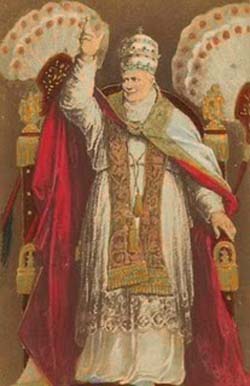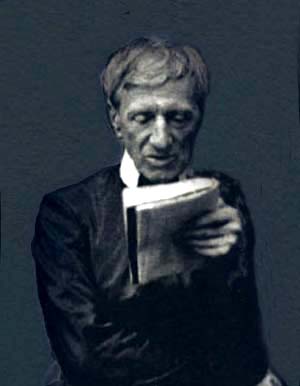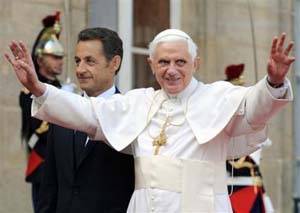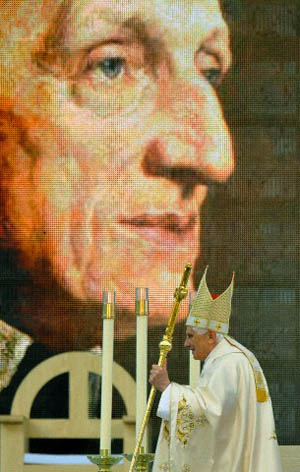 |
Traditionalist Issues
Newman and the Pope - Part III
'The Syllabus Has No Dogmatic Force'
James Larson
In my last article I showed that Newman affirmed the Syllabus did not represent the mind of the Pope to undermine its authority. Here I will see how he tries to establish that the papal document has no dogmatic force. Newman's efforts are threefold:
First, as already analyzed, he makes every effort and uses every subtlety to separate it from the Pope.

Pius IX clearly put his full authority behind the Syllabus |
Second, he exercises a similar subterfuge to separate the Syllabus from the encyclical Quanta Cura (Condemning current errors). He writes: "The Syllabus does not exist as far as the language of the Encyclical is concerned."
This, of course, is defenseless. The Pope ordered Cardinal Antonelli to send Quanta cura along with the Syllabus to all the Bishops. Cardinal Antonelli's letter of introduction read as follows:
"Our Holy Father, Pius IX, Sovereign Pontiff, being profoundly anxious for the salvation of souls and of sound doctrine, has never ceased from the commencement of his pontificate to proscribe and condemn the chief errors and false doctrine of our most unhappy age, by his published Encyclicals, and Consistorial Allocutions and Apostolic Letters.
"But as it may happen that all the pontifical acts do not reach each one of the ordinaries, the same Sovereign Pontiff has willed that a Syllabus of the same errors should be compiled, to be sent to all the Bishops of the Catholic world, in order that these Bishops may have before their eyes all the errors and pernicious doctrines which he has reprobated and condemned.
"He has consequently charged me to take care that this Syllabus, having been printed, should be sent to you [Excellency] on this occasion ..."
The Syllabus is bound to Quanta cura
The Syllabus was obviously meant to augment the encyclical with greater detail by documenting individual errors. Both documents dealt with modern errors, and complemented one another. In Quanta cura, Pius IX, in speaking of past actions, says:
"We raised Our voice, and in many published Encyclical Letters and Allocutions delivered in Consistory, and other Apostolic Letters, we condemned the chief errors of this most unhappy age ...
"We condemned the monstrous portents of opinion that prevail especially in this age, bringing with them the greatest loss of souls and detriment of civil society itself, which are grievously opposed not only to the Catholic Church and her salutary doctrine and venerable rights, but also to the eternal natural law engravened by God in all men’s hearts and to right reason; and from which almost all other errors have their origin."
It is these "chief errors" spoken of by the Pope in Quanta cura that are detailed and documented in the Syllabus. The two documents are clearly bound to one another.
Newman denies its dogmatic nature
Third, Newman does everything he can to undermine the "universal application" of these condemnations. After flatly stating that "the Syllabus then has no dogmatic force," he further writes:

Newman: a liberal reading |
"It [the Syllabus] is to be received from the Pope by an act of obedience, not of faith, that obedience being shown by having recourse to the original and authoritative documents."
In other words, we are entirely relieved of all responsibility to obey any universality in the truths expressed in the propositions in themselves. It is Newman's position that the individual propositions have no universal verity, no dogmatic force, and that their meaning and applicability are to be reduced to the particular historical situations, etc., that surrounded their original statement in the individual papal documents of Pius IX.
Five times, in fact, he refers to the Syllabus as being merely an "index" to these previous documents, and he says, "But we can no more accept it as de fide, as a dogmatic document, than any other index or table of contents." This is proved manifestly false by the very title of the document: A Syllabus containing the most important errors of our time, which have been condemned by our Holy Father Pius IX in Allocutions, at Consistories, in Encyclicals, and other Apostolic Letters.
The Syllabus is intended by the Pope to condemn "the most important errors of our time." These errors were not limited to a particular country, to an individual literary work, etc.
It is certainly good to have reference to the particular Allocution, Encyclical, etc. in order to obtain depth and accuracy of understanding of these propositions, but this "recourse" to these original contexts should in no way be used to undermine the universal application of these condemnations.
A soft interpretation of Church-State relations
In order to perceive the depths of subterfuge involved here, let us look at Newman's handling of one single condemned proposition n. 77: "It is no longer expedient that the Catholic Religion should be established to the exclusion of all others."
Here is Newman's "reduction" of this particular proposition:
"When we turn to the Allocution, which is the ground of its being put into the Syllabus, what do we find there? First, that the Pope was speaking, not of States universally, but of one particular State, Spain, definitely Spain; second, that he was not noting the erroneous proposition directly, or categorically, but was protesting against the breach in many ways of the Concordat on the part of the Spanish government; further, that he was not referring to any work containing the said proposition, nor contemplating any proposition at all; nor, on the other hand, using any word of condemnation whatever, nor using any harsher terms of the Government in question than an expression of 'his wonder and distress.'
"And again, taking the Pope's remonstrance as it stands, is it any great cause of complaint to Englishmen, who so lately were severe in their legislation upon Unitarians, Catholics, unbelievers and others, that the Pope merely does not think it expedient for every State from this time forth to tolerate every sort of religion on its territory, and to disestablish the Church at once? For this is all that he denies. As in the instance in the foregoing section, he does but deny a universal implementation, which the 'erroneous proposition' asserts without any explanation."

Pope Ratzinger called for a "positive secularism" during his visit to France 2008 |
Newman here clearly uses every means possible to minimize the meaning and extent of this proposition's condemnation. According to Newman, the condemnation only has application to Spain. It only applies to breaches of the Concordant by that government. It is really not a condemnation at all, but only an expression of "wonder and distress." And it is reducible to the position "that the Pope merely does not think it expedient for every State from this time forth to tolerate every sort of religion on its territory, and to disestablish the Church at once."
To perceive the falsity involved in this subterfuge, one need only look to Quanta cura for a true explication of this condemned proposition. Here, the Pope writes:
"For you well know, venerable brethren, that at this time not a few men are found who, applying to civil society the impious and absurd principle of 'naturalism,' as they call it, dare to teach that 'the best constitution of public society and (also) civil progress altogether require that human society be conducted and governed without regard being had to religion any more than if it did not exist; or, at least, without any distinction being made between the true religion and false ones.'
"And, against the doctrine of Scripture, of the Church, and of the Holy Fathers, they do not hesitate to assert that 'that is the best condition of civil society, in which no duty is recognized, as attached to the civil power, of restraining by enacted penalties, offenders against the Catholic religion, except so far as public peace may require'"
In other words, Proposition 77 says just exactly what it appears to say: It condemns precisely what it appears to condemn, and this in its obvious and universal sense. And, it affirms its opposite - that it is expedient that the Catholic Religion should be established to the exclusion of all others.
Church-State position confirmed by Leo XIII
The Syllabus really came to fruition in the social encyclicals of Pope Leo XIII. There, we can find the full development and universal applicability of the condemnation of Proposition 77. Interestingly enough, in Leo XIII's Encyclical Immortale Dei (Christian constitution of States), we find a passage which seems very applicable to Newman and his relationship to the Syllabus of Pius IX:
"On the question of the separation of the Church and State, the same Pontiff [Gregory XVI] writes as follows: 'Nor can we hope for happier results, either for religion or for the civil government, from the wishes of those who desire that the Church be separated from the State, and that the concord between the secular and ecclesiastical authority be dissolved. It is clear that these men, who yearn for a shameless liberty, live in dread of an agreement which has always been fraught with good, and advantageous both to sacred and civil interests.'
"To like effect, also, as occasion presented itself, did Pius IX publicly brand many false opinions that were gaining ground, and afterwards ordered them to be condensed in summary [the Syllabus] in order that in this sea of error Catholics might have a light which they might safely follow."
It is this light which Newman dimmed with his obfuscations.
A Pope who follows Newman's vision
It is known what a great distaste Newman held for Pius IX. We now have a Pope who would be of his liking. The following is taken from my work The War Against Being:
The year 1982 saw the publication of Cardinal Ratzinger's book Principles of Catholic Theology. The book contains an Epilogue "On the Status of Church and Theology Today." Part B is titled "Church and World: An Inquiry into the Reception of Vatican Council II." The text focuses primarily on the Vatican II document The Pastoral Constitution on the Church in the Modern World (Gaudium et Spes), which the Cardinal calls "a kind of summa of Christian anthropology."

Benedict, a disciple of Newman, at his beatification Mass |
The following is of immediate interest to our subject:
"If it is desirable to offer a diagnosis of the text (Gaudium et Spes) as a whole, we might say that (in conjunction with the texts on religious liberty and world religions) it is a revision of the Syllabus of Pius IX, a kind of counter-syllabus.
"Harnack, as we know, interpreted the Syllabus of Pius IX as nothing less than a declaration of war against his generation. This is correct insofar as the Syllabus established a line of demarcation against the determining forces of the 19th century: against the scientific and political world view of Liberalism. In the struggle against Modernism this twofold delimitation was ratified and strengthened.
"Since then many things have changed. The new ecclesiastical policy of Pius XI produced a certain openness toward a liberal understanding of the State. In a quiet but persistent struggle, exegesis and Church history adopted more and more the postulates of liberal science, and Liberalism, too, was obliged to undergo many significant changes in the great political upheavals of the 20th century.
"As a result, the one-sidedness of the position adopted by the Church under Pius IX and Pius X in response to the situation created by the new phase of history inaugurated by the French Revolution was, to a large extent, corrected per viam facti, especially in Central Europe. But there was still no basic statement of the relationship that should exist between the Church and the world that had come into existence after 1789. In fact, an attitude that was largely pre-revolutionary continued to exist in countries with strong Catholic majorities.
"Hardly anyone today will deny that the Spanish and Italian Concordats strove to preserve too much of a view of the world that no longer corresponded to the facts. Hardly anyone today will deny that, in the field of education and with respect to the historico-critical method in modern science, anachronisms existed that corresponded closely to this adherence to an obsolete Church-State relationship ...
"Let us be content to say here that the text serves as a counter-syllabus and, as such, represents, on the part of the Church, an attempt at an official reconciliation with the new era inaugurated in 1789."
As noted in the first article, Cardinal Newman hoped for the death of Pius IX, and the election of a successor more to his liking. Cardinal Newman now has his Pope.

Posted February 25, 2012
James Larson first published this article
on his webpage War against Being

Related Topics of Interest
 Newman: 'The Syllabus Does Not Represent The Mind of the Pope' Newman: 'The Syllabus Does Not Represent The Mind of the Pope'
 Duplicity of Newman Regarding the Papacy Duplicity of Newman Regarding the Papacy
 Newman Regrets the Syllabus Newman Regrets the Syllabus
 Vatican II Turnaround on the Church-State Relationship Vatican II Turnaround on the Church-State Relationship
 Vatican II's Position on Religious Liberty Vatican II's Position on Religious Liberty
 Doubts about the Beatification of Card. Newman Doubts about the Beatification of Card. Newman
 Religious Liberty, a ‘Monstrous Right’ Religious Liberty, a ‘Monstrous Right’

Related Works of Interest
|
|
Traditionalism | Hot Topics | Home | Books | CDs | Search | Contact Us | Donate

© 2002- Tradition in Action, Inc. All Rights
Reserved
|
 |
|